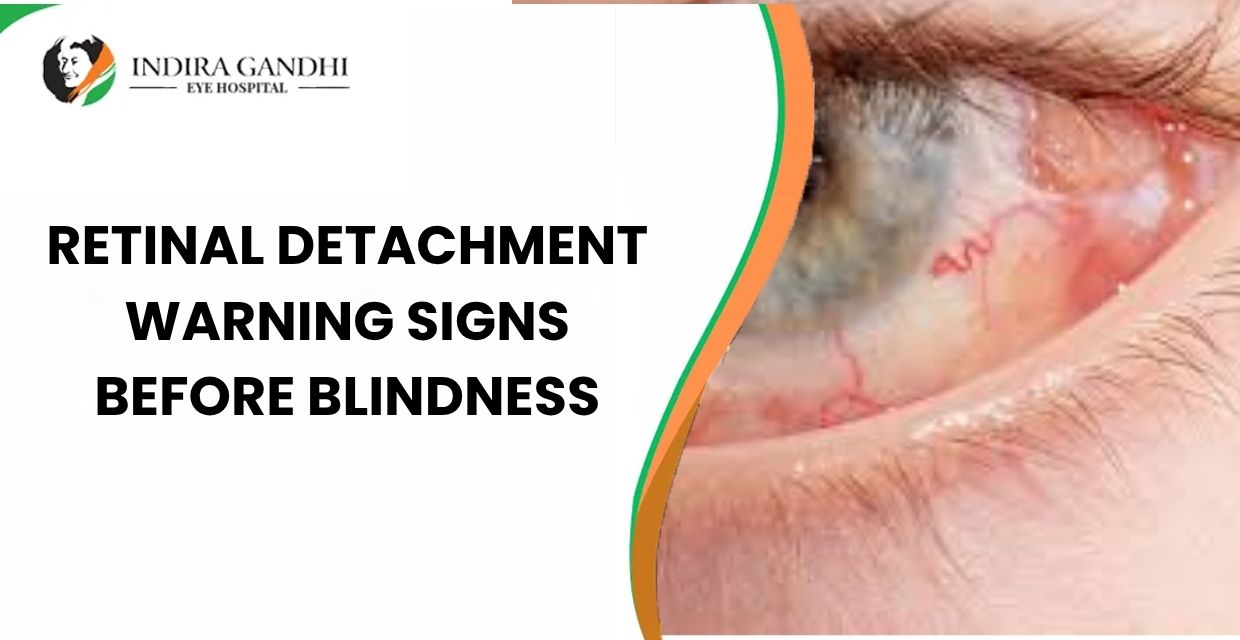Hearing the phrase “retinal detachment” is frightening because it immediately brings up the possibility of vision loss. It is one of the few true medical emergencies in ophthalmology, a condition where every hour counts. Naturally, if you suspect this is happening, your mind races with the most critical question: how long before retinal detachment causes blindness?
This is a time-sensitive issue where knowledge is your most powerful defense. Retinal detachment occurs when the thin layer of tissue lining the back of your eye (the retina) pulls away from the layer beneath it, cutting off its vital supply of oxygen and nutrients. When this separation occurs, the clock starts ticking.
The simple, yet terrifying, answer to how long before retinal detachment causes blindness is that it varies from a matter of hours to a few days, especially if the central part of your vision (the macula) becomes involved. Because time is vision, this comprehensive guide will walk you through the undeniable warning signs and the absolute necessity of immediate, professional treatment. Being able to recognize these symptoms and understanding the urgency of the condition is the best way you can protect your sight.
What is Retinal Detachment? The Anatomy of an Emergency
To understand the warning signs, you first need to understand the retina’s crucial role. The retina is like the film in a camera or the sensor in a digital one. It converts the light that enters your eye into electrical signals, which are then sent to the brain via the optic nerve. It is a thin, delicate tissue that must remain perfectly attached to the underlying choroid layer, which provides the necessary blood supply and oxygen.
Retinal detachment (RD) happens when the retina separates from the choroid. The analogy often used by specialists is that it is like wallpaper peeling away from a wall. Once peeled, that section of the retina cannot function, and the corresponding part of your vision is lost.
There are three main types of RD, with the first being the most common:
- Rhegmatogenous RD: Caused by a small tear or break in the retina, allowing fluid from the vitreous gel (the clear gel filling the eye) to seep underneath and peel the retina away. This is usually due to the natural shrinking of the vitreous (Posterior Vitreous Detachment or PVD), which tugs on the retina.
- Tractional RD: Caused by scar tissue or abnormal membranes forming on the retina’s surface, pulling it away. This is most often seen in advanced cases of diabetic retinopathy where abnormal blood vessels bleed and create fibrous scar tissue.
- Exudative RD: Caused by fluid leaking underneath the retina without a tear. This can be due to inflammatory disorders, tumors, or injury.
The development of any of these is the start of a race against the clock, making the question of how long before retinal detachment causes blindness a matter of minutes and hours, not weeks or months.
The Critical Warning Signs: What You Must Know
For rhegmatogenous RD, the warning signs are typically sudden and noticeable. They are a direct result of the retina being stretched, torn, or separated. If you experience any combination of these symptoms, you must seek emergency care immediately.
1. Flashes of Light (Photopsia)
This is often the very first sign that something is wrong. You may suddenly see brief, lightning-like flashes or sparks in your peripheral vision, usually lasting less than a second.
- Why it happens: As the vitreous gel inside your eye shrinks and pulls on the retina, the mechanical tug stimulates the light-sensitive photoreceptor cells. Your brain interprets this mechanical stimulation as light. This is your eye sending a physical warning that a tear may be forming.
2. A Sudden Shower of Floaters
Floaters are common, especially as we age. They are small specks, spots, or threads that drift across your field of vision. They are usually just shadows cast by tiny clumps of collagen within the vitreous gel. However, a sudden, dramatic increase in their number is an extreme red flag.
- Why it happens: A sudden shower of new floaters, often described as a cloud of gnats, a cobweb, or a shower of soot, usually indicates bleeding has occurred after the tear has formed. The tiny blood cells or pigment cells released from the tear cast these intense shadows.
3. The Curtain or Veil Over Vision
This is the sign that the retina has physically detached and is now blocking your vision. It is a severe, late-stage symptom, but still demands immediate attention.
- What it feels like: Patients often describe this as a dark shadow, a gray curtain, or a veil being pulled across their field of vision. It is a painless, distinct area of vision loss that does not go away. It often starts in the periphery and moves toward the center.
The appearance of the curtain means that a portion of the retina is already starved of oxygen. At this stage, the window for successful repair and maximum vision recovery is closing rapidly, making the answer to how long before retinal detachment causes blindness incredibly short.
The Urgent Timeframe: How Long Before Retinal Detachment Causes Blindness?
This is the most crucial section, directly addressing the underlying fear behind the question, how long before retinal detachment causes blindness. The answer is completely dependent on one factor: Is the macula involved?
Need an Eye Test or Treatment?
Get your vision checked by trusted specialists. From routine eye tests to advanced treatments, our experts ensure the best care for your eyes. Book your appointment today for healthy and clear vision!
Book Appointment with Eye ExpertMacula-On Detachment (Macula Attached)
- Description: The retinal detachment has occurred, but the detachment line has not yet reached the macula, the small, central area responsible for 20/20 reading and color vision. At this stage, the vision loss is mainly confined to the periphery (the curtain is on the side).
- The Urgency: This is the most critical state for surgeons. If the macula is still attached, emergency surgery is required within 24 to 72 hours to prevent the macula from detaching. Successfully repairing the retina before the macula is involved offers the best prognosis for a full recovery of central vision. Any delay increases the answer to how long before retinal detachment causes blindness from “not long” to “potentially permanent.”
Macula-Off Detachment (Macula Detached)
- Description: The detachment has reached the macula, meaning the patient has experienced a sudden, severe loss of central, sharp vision. This is the moment when significant, often permanent, vision loss occurs.
- The Urgency: While still an emergency, the urgency shifts from preventing central vision loss to salvaging what peripheral vision is left and preventing the eye from collapsing. Surgery is typically performed within one week to maximize the chance of the best possible visual outcome, though the patient is often warned that their central vision may never fully return to normal. The macula can sustain irreversible damage after only a few days of separation. This means the question of how long before retinal detachment causes blindness can be answered with “it has already begun.”
In simple terms, for a macula-on detachment, the answer to how long before retinal detachment causes blindness is hours to days. For a macula-off detachment, significant central vision has already been lost, and the battle shifts to minimizing the permanent damage that has occurred.
Who is at Risk? Prevention Through Awareness
Since you cannot prevent the vitreous gel from aging, the best way to deal with RD is to know your risk factors and ensure regular screening. Being aware of your risk is the first step toward preventing the devastating outcome of asking how long before retinal detachment causes blindness.
1. Severe Nearsightedness (High Myopia)
This is the single greatest risk factor. Highly myopic eyes are typically longer than normal, causing the retina to be stretched thin and making it much more susceptible to tears and breaks. If your prescription is high, you should be checking for the warning signs often.
2. Previous Eye Surgery
Having cataract surgery significantly increases the risk of RD, sometimes months or years after the procedure. Similarly, prior surgery for glaucoma or retinal problems increases the risk.
3. Previous Retinal Detachment in the Other Eye
If you have had RD in one eye, your risk of developing it in the other eye is significantly elevated.
4. Severe Eye Trauma
A sharp blow to the head or eye can directly tear the retina. Always wear protective eyewear during sports or hazardous activities.
5. Family History
If a close relative has experienced retinal detachment, your risk is higher due to potential genetic predisposition in retinal or vitreous structure.
Immediate Action and Treatment
If you notice any of the flashes, floaters, or the curtain described above, you must take action immediately. Do not wait for a regular appointment.
1. What to Do Immediately
- GO TO THE NEAREST EMERGENCY ROOM OR OPHTHALMOLOGIST’S OFFICE. Do not delay. Call ahead and tell them you suspect a retinal detachment.
- Avoid Physical Activity: While you wait for medical attention, try to limit your head and eye movements. You may be asked to lie down.
2. Treatment Options (Surgical Solutions)
RD requires surgery to reattach the retina. The type of surgery depends on the severity and type of detachment:
- Pneumatic Retinopexy: Used for simple detachments. A gas bubble is injected into the eye to push the retina back into place, and freezing or laser is used to seal the tear.
- Scleral Buckle: A silicone band is placed around the outside of the eye to gently push the wall of the eye inward, supporting the tear and helping the retina reattach.
- Vitrectomy: The most common approach. The vitreous gel is removed, and the surgeon repositions the retina. The eye is then filled with a gas or silicone oil bubble to hold the retina in place while it heals.
Need an Eye Test or Treatment?
Get your vision checked by trusted specialists. From routine eye tests to advanced treatments, our experts ensure the best care for your eyes. Book your appointment today for healthy and clear vision!
Book Appointment with Eye ExpertFrequently Asked Questions (FAQs)
If I see floaters, does it always mean I have a retinal detachment?
No, floaters are common and often harmless. However, a sudden, significant increase in the number or density of floaters, especially if accompanied by flashes of light, is a sign that demands immediate professional evaluation.
Will I feel pain if my retina detaches?
Typically, retinal detachment is painless. The pain associated with the acute condition usually comes from the severe headache or the sudden spike in pressure, as seen in acute angle-closure glaucoma, which can be misdiagnosed.
How often should someone with high myopia get their eyes checked?
Individuals with high myopia should have a comprehensive, dilated eye exam, including a careful peripheral retinal examination, at least once a year, or immediately if any new symptoms appear.
Can a tear be caught before it becomes a full detachment?
Yes, in many cases, a retinal tear can be found and sealed with a laser (laser photocoagulation) before fluid seeps underneath and causes a full detachment. This is the goal of regular check-ups.
Can wearing protective glasses prevent retinal detachment?
Protective eyewear cannot prevent age-related detachment, but it is highly effective at preventing detachments caused by trauma or impact during sports or work, which is a major preventable cause.
If I have had the surgery, will my vision be immediately back to normal?
Vision recovery is slow and depends heavily on whether the macula was involved. It can take several weeks or months for the best possible vision to return.
Your Vision, Our Priority: Expert Care at Indira Gandhi Eye Hospitals
The fear of asking how long before retinal detachment causes blindness is profound, but your awareness is your greatest asset. Knowing the warning signs—flashes, a shower of floaters, and a curtain of vision loss—empowers you to act decisively.
At Indira Gandhi Eye Hospitals, we treat retinal detachment as the time-critical medical emergency that it is. Our team of skilled vitreoretinal surgeons is equipped with the advanced technology necessary for immediate diagnosis and surgical intervention. When every hour determines the future of your sight, you need the assurance of expert care.
For any sudden visual changes, or if you are in a high-risk group, do not delay your consultation. Let Indira Gandhi Eye Hospitals be your trusted partner in safeguarding your sight against the urgency of retinal detachment.












